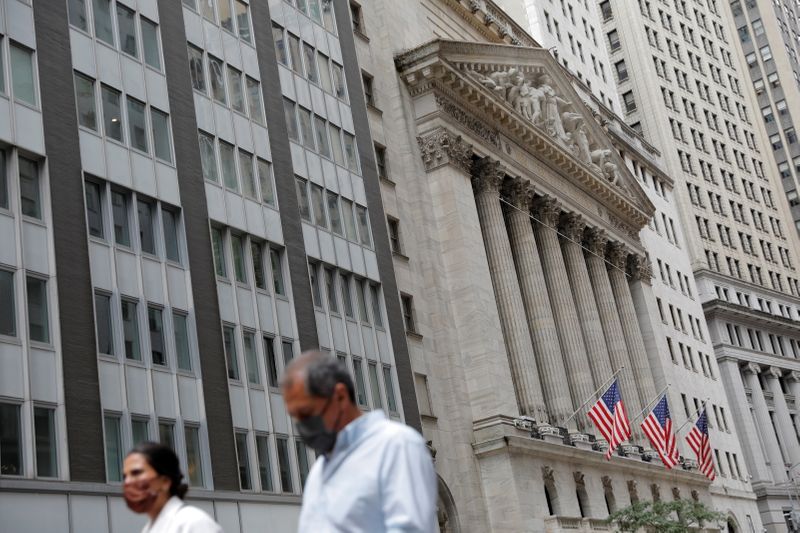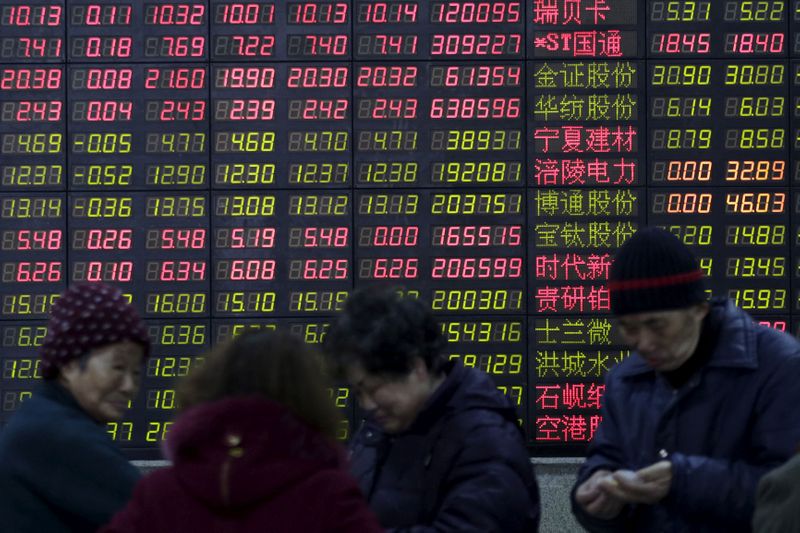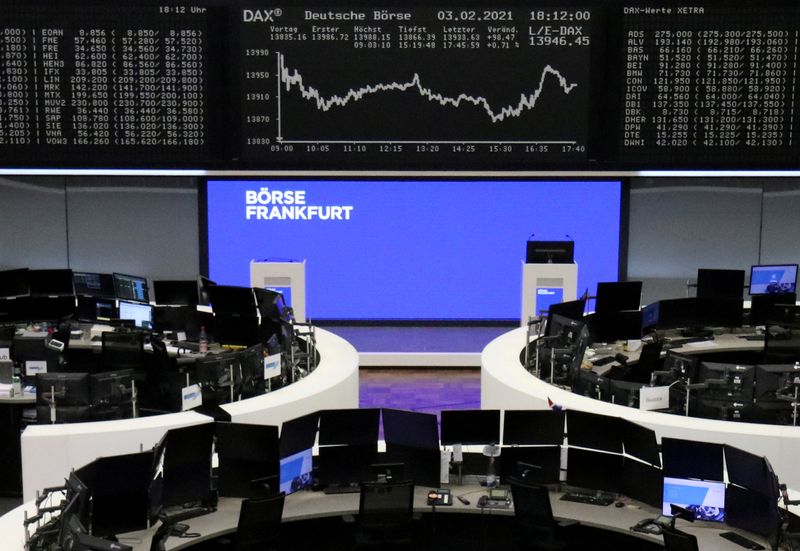By Koh Gui Qing
NEW YORK (Reuters) -U.S. stocks fell from record highs on Tuesday while real U.S. bond yields hit all-time lows, as a sell-off in Chinese shares, economic growth concerns and the Federal Reserve’s policy meeting put investors on guard and drove profit taking.
Unsettled by events in China overnight, where share prices skidded on concerns about the impact of a recent tightening in government regulations, global stock markets pulled back on Tuesday as volatility spiked.
In the United States, investors turned cautious as they awaited the Fed’s policy statement at the close of its two-day meeting, which began on Tuesday.
All eyes will be on what Fed Chair Jerome Powell says at a post-meeting news conference on Wednesday at 2 p.m. EDT (1800 GMT), especially in relation to inflation, economic growth, interest rates and when the Fed will likely start reducing its purchases of government bonds.
Some investors worry that the fast-spreading Delta variant of the coronavirus may thwart the global economic recovery, at a time when inflation in countries such as the United States has accelerated faster than expected. A stalled economic recovery and rising price pressures would complicate monetary policy, and force central banks to balance the objectives of supporting growth and tempering price rises.
“There is some concern over where we are on monetary policy,” said Peter Kenny, founder of Kenny’s Commentary LLC and Strategic Board Solutions Llc in New York.
“There’s no question that the Fed is going to address the elephant in the room, and that is inflation,” Kenny said. “It appears that inflation is not transitory.”
Analysts agree that low interest rates are generally a boon for equities and any sign of a faster-than-expected tightening in the Fed’s policy – whether raising interest rates or tapering bond purchases – could rattle the stock market.
The Dow Jones Industrial Average ended down 0.2% at 35,059 points, and the S&P 500 shed 0.5% to end at 4,401 points. The Nasdaq Composite slid 1.2% to 14,660 points, its biggest one-day drop since May 12, hurt by some bets that the earnings growth of tech stocks is already priced into valuations.
The pan-European STOXX 600 index finished 0.54% lower and MSCI’s gauge of stocks across the globe shed 0.81%.
Still, losses on Wall Street and in Europe were modest compared with overnight declines in China. The blue-chip Chinese CSI300 index plunged 3.5%, while the Hang Seng Tech index tumbled almost 8%, losing a whopping 17% in just three days. [.SS]
In keeping with the muted mood in markets, the yield on 10-year Treasury inflation-protected securities (TIPS) hit an all-time low of -1.147% before rebounding to -1.129%. [US/]
Real, or inflation-adjusted, bond yields across major economies have fallen in recent sessions, which analysts attribute to growing concern about the economic outlook, as well as technical factors such as hefty bond-buying by central banks.
The yield on 10-year Treasury notes was down at 1.238%.
Currency investors also played it safe before the Fed meeting outcome. The dollar, which has risen broadly for more than a month on expectations that, as the economy strengthened, the Fed would tighten its policies, gave up some gains on Tuesday as investors shunned big bets before Powell’s remarks.
The dollar index fell 0.17%, and a softer dollar lifted the euro by 0.16% to $1.1821.[USD/]
The somber mood led oil prices to give up earlier gains. U.S. crude settled 0.36% lower at $71.65 per barrel and Brent was at $74.48, down 0.03% on the day.
The slight risk aversion amongst investors benefited bullion. Spot gold added 0.1% to $1,799.64 an ounce. U.S. gold futures gained 0.28% to $1,799.50 an ounce. [GOL/]
Cryptocurrencies, a barometer of investors’ risk appetites, also succumbed to the cautious overtone in markets and pared earlier gains.
Bitcoin last rose 1.8% to $37,960.44, recouping some losses after Amazon.com Inc offered a qualified denial of a weekend news report that said it was preparing to accept cryptocurrencies.
(Reporting by Koh Gui Qing; additional reporting by Carolyn Cohn, Dhara Ranasinghe, Sujata Rao in London and Alun John in Hong Kong; editing by Steve Orlofsky, Leslie Adler and Jonathan Oatis)

























